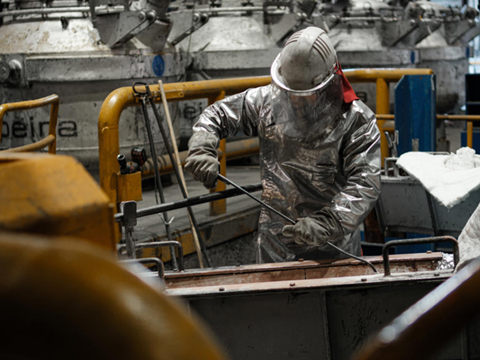
Aluminium recycler Speira’s Grevenbroich and Töging plants are being upgraded with four tiltable rotary furnaces to handle heavily contaminated scrap and dross, or ‘low grades’, produced during the melting process.
Around eleven million euros are set to be invested into the four furnaces, two in each facility – encompassing charging machines, suction hoods, thermal afterburners, piping, and other infrastructure. The inclusion of automatic charging and ‘state-of-the-art’ burner technology is expected to achieve a higher metal yield.
Apparently, the individual components are easy to access for maintenance; the molten metal can be tapped while the furnace doors are closed; and the presence of charging machines is expected to minimize wheel loader and forklift traffic in front of the furnaces.
The chosen model is reported to meet the highest environmental standards for new systems, as the suction and burner technology claims to save CO2, while the “H2 ready” furnaces are anticipated to operate with hydrogen in the future.
Energy efficiency is set to improve by threefold. Speira attributes this to increased throughput, with each tonne of recycled aluminium set to save up to 95% of the energy required to produce one tonne of primary aluminium. The modern burner and afterburner technology are set to achieve the optimal energy yield from the natural gas used.
Meanwhile, the impurities from the low-grade scraps are expected to serve as combustibles in the melting process, with the input spectrum for these grades increasing in the new furnaces. Additionally, the firnace is designed to lose less heat due to the automatic charging process and closed-door tapping.
“We take a holistic view of our contribution to a functioning circular economy,” says Ralf Köring, head of Recycling Services. “That’s why we don’t just look at the pure, easy-to-recycle scraps, but also at the more difficult lower grades and by-products.
“Wherever aluminum is in it, we want to get the maximum out of it and put it back into the cycle.”
The furnaces are scheduled to be installed one at a time. The first furnaces at Grevenbroich and Töging are expected to start production in May and October 2025, respectively; the second in each is anticipated for installation a year later.
Back in 2023, Plug Power helped Ardagh Glass Limmared AB, Hydro Havrand, and the APEX Group install five-megawatt electrolyzers into their plants – an effort set to produce industrial-scale green hydrogen in aluminium recycling, as well as the manufacturing processes for glass and steel.
Ardagh Glass Packaging has apparently been achieving a consistent CO2 emissions reduction of 64% at its large-scale NextGen hybrid furnace in Obernkirchen, for which it has become a Sustainability Award nominee under this year’s Climate category. The facility claims to use 80% renewable electricity and 20% gas.
If you liked this story, you might also enjoy:
How are the top brands progressing on packaging sustainability?
Sustainable Innovation Report 2024: Current trends and future priorities
Reuse vs. single use – which is better for the environment?
The ultimate guide to global plastic sustainability regulation














No comments yet